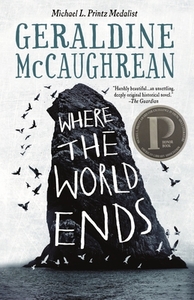Take a photo of a barcode or cover
History brought to life so vividly I felt trapped with them on the Stac, surrounded by icy water.
Where The World Ends is a stunning and absorbing read. From the first page, I was hook by this historical novel about a group of boys stuck on an isolated sea stack. Fantastic storytelling and awe-inspiring writing.
I’m still not sure how I feel about this one...I found it incredibly difficult to get into, and it took me a long time to warm to the characters, however once I did, I found their story really compelling. The way the environment was described was beautiful yet hostile, but overall I found it a little too bleak for me. ⭐️⭐️⭐️

This wasn't for me despite being a fan of the author descriptive writing style. I was left bored and disinterested in the story, and more often than not, found myself zoning out and not really paying attention to what was happening. Unfortunately this was a miss for me but I will definitely consider giving this another try in the future.
Over the summer, I travelled to Scotland. I remember going into a little community-run museum in Fort Williams that I absolutely loved, especially the room they had a room all about St. Kilda. As someone whose ears perk up when they hear anything relating to the Atlantic Ocean, islands, and birds, I was fascinated. I bought a book from the gift shop and slowly began to learn about St. Kilda.
Where the World Ends focuses on one specific event in the long history of St. Kilda, but I find it an important one that introduces readers to the beautifully rugged world of rocks, birds, and the ocean. McCaughrean's story is an imagining of what happened to the group of boys while stranded on the Warrior Stac. It makes one realize that this event was not simply the abandonment of fowlers on a stac, but a trying experience that specific boys had to face with courage I can't imagine being able to muster.
In short, it reminds me a bit of Lord of the Flies, except this time with begrudging adults who probably wanted to get off the island more than everyone else. In long, it is REAL and it HAPPENED, and if you read the book, I think you'll understand that the dedication McCaughrean wrote has never been more meaningful.
Where the World Ends focuses on one specific event in the long history of St. Kilda, but I find it an important one that introduces readers to the beautifully rugged world of rocks, birds, and the ocean. McCaughrean's story is an imagining of what happened to the group of boys while stranded on the Warrior Stac. It makes one realize that this event was not simply the abandonment of fowlers on a stac, but a trying experience that specific boys had to face with courage I can't imagine being able to muster.
In short, it reminds me a bit of Lord of the Flies, except this time with begrudging adults who probably wanted to get off the island more than everyone else. In long, it is REAL and it HAPPENED, and if you read the book, I think you'll understand that the dedication McCaughrean wrote has never been more meaningful.
Geraldine McCaughrean has taken the bones of a true story about a group of men and boys who were stranded for nine months on the most remote of the remote Scottish islands. They go every summer to catch birds and collect eggs, feathers, and nests, usually staying two to three weeks. It's something of a rite of passage for the boys in this small, remote community, whose livelihoods depend on what they can harvest from the inhospitable natural world around them. This year, no one comes to fetch them.
This is a powerful and extraordinary story, and McCaughrean is at her best when she lets the story - the hardship, the incredibly hostile landscape, and the relationships between the boys and men - tell itself plainly. I felt it bogged down a little about two-thirds of the way through, and to be honest didn't feel the "metafictional" aspects of it (McCaughrean's specialty) were necessary. I grew up and still live near a coastline that is as harsh and inhospitable as the one depicted here, so the landscape came vividly to life for me. I also very much liked Quilliam, the viewpoint character. The ending is powerful and moving. It well deserves the recognition it has received, even though it didn't completely hit the mark for me.
This is a powerful and extraordinary story, and McCaughrean is at her best when she lets the story - the hardship, the incredibly hostile landscape, and the relationships between the boys and men - tell itself plainly. I felt it bogged down a little about two-thirds of the way through, and to be honest didn't feel the "metafictional" aspects of it (McCaughrean's specialty) were necessary. I grew up and still live near a coastline that is as harsh and inhospitable as the one depicted here, so the landscape came vividly to life for me. I also very much liked Quilliam, the viewpoint character. The ending is powerful and moving. It well deserves the recognition it has received, even though it didn't completely hit the mark for me.
DNF. Gave it a solid 70% but just could not stay with the story.
The story of teen boys who got trapped on an island crag off of St Kilda in the early 1700s. I can see why it would draw comparisons to Lord of the Flies though it’s much more civilised and grittier in ways too. More realistic and less dramatic. Well drawn characters and interesting landscapes I enjoyed reading this.













